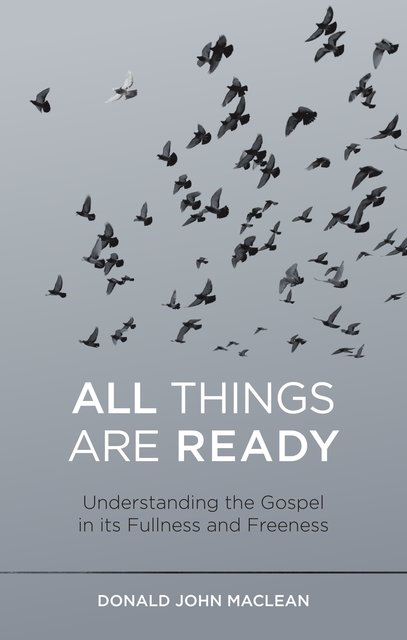What is the gospel? Who is the gospel for? How should the gospel be preached? What kind of people should implore men and women to come to Christ? These and many other questions are covered in Donald John Maclean’s first book ‘All Things are Ready’. Uniquely qualified, having completed a PhD in James Durham (1622-1658), Donald John takes us an a ‘tour de force’ of Biblical teaching and reformed theology. Warmly and succinctly, Maclean makes a compelling case that the ‘free offer of the gospel’ flows from the mainstream of biblical theology and reformed history.
Church history is cyclical and in almost every generation there is a move towards legalism and ‘Hyper-Calvinism’. In the 18th century Thomas Boston and the Erskines fought against it during the ‘Marrow Controversy’. Spurgeon fought against the Hyper-Calvinists in England in the 19th century and there have been skirmishes in the 20th century as churches have sought to reconcile the apparent Biblical paradox of divine command and human responsibility in the call of the gospel.
In this book Donald John Maclean beautifully takes us to the heart of the gospel. He reminds us of all the different ways the gospel is offered in the Bible: an entreaty, a sale, a command, a promise, a warning, standing and knocking and the gospel as an entreaty. The gospel call is much more that a sharing of information, it is a pleading, an entreaty a call. As Samuel Rutherford says, ‘It is ordinary for man to beg from God, for we are but His beggars; but it is a miracle to see God beg at man. Yet here is the Potter begging from the clay; the Saviour seeking from sinners.’
But to whom is the gospel offered? Is it only to the spiritually burdened, to the thirsty, the repentant, or is the gospel offer open to all? How do we reconcile limited atonement and passages such as Isaiah 45 v 22, Acts 17 v 30 and Luke 2 v 10? Well, the answer is we do not. As Maclean says: ‘Our limitations mean the one will of God may appear manifold from our perspective.’ We preach Christ to all without distinction while believing that God is ultimately calling a people to Himself. As Calvin says: ‘He invites the whole world to the hope of salvation.’
Many have wrestled with the will of God and the doctrine of election but Maclean helpfully takes us on a Biblical study of God’s revealed will in the Old and New Testament and particularly in the Gospels and the Epistles. He leaves no stone unturned in seeking to prove from Scripture that we have a God and Saviour who wants us to accept ‘so great a salvation’. As Thomas Boston says ‘Christ is willing to come into every heart. Why else does he demand open doors, but because he is willing to enter?’
The book ends with a helpful chapter on objections to the free offer such as, ‘If I am dead in sin why invite me to believe?’ ‘If God has chosen me to believe why invite me to believe?’ These are helpfully and pastorally answered with biblical answers and the best of James Durham and Prof John Murray.
‘All Things are Ready’ is a beautiful reminder to us of the glorious overtures of a loving God towards hell deserving sinners. Maclean reminds us that the Puritans and the Reformers were not cold, stoic academics, but warm-hearted preachers and pastors who pleaded with men and women to be reconciled to a loving God and a tender Saviour. The free offer of the gospel is not some departure from Biblical theology and reformed history but rather the outflowing of a true understanding of the gospel and how to communicate that to sinners. If you want to have your heart warmed and once again see the glory of the gospel of Christ, I cannot recommend strongly enough that you read this book.
If you would like to hear more about this subject, there is a Ragged Theology Podcast with Donald John Maclean available here. He has also written further on the free offer here.
This book is available to purchase from Christian Focus.
Andy Murray, Livingston Free Church

